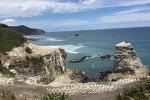Tuatara Facts
BabiesThe female lays 8 - 15 eggs in a shallow hole in the ground. The eggs are not cared for in any way by the parents. It takes 12 - 15 months for the young to hatch. The female may only lay eggs every 3 - 4 years FoodTuataras are carnivores. They eat weta, moths and beetles. Sometimes they eat small lizards and even the eggs and chicks of petrels. At the zoo we feed them baby mice, huhu grubs, worms, meal worms and insects. They are fed twice a month. Where are They?Tuataras were once found all over New Zealand but now they only survive on offshore islands because of the rodents, wild cats and pigs that were introduced to the mainland. Rarere_K@wcc.govt.nz via Richard Naylor on soc.culture.new-zealand.More Tuatara FactsFurther to Martin Hunt's information on numbers of tuatara, they are found on ~30 islands around New Zealand, having become extinct from the mainland last century. Total estimated numbers are 50,000-60,000, but over half of those are on Stephens Island where numbers are exceptionally high. Tuatara are listed as rare in the 1992 IUCN Red Data Book.Note that only 7 of the remaining populations are considered healthy. The others are at risk due to small population size and/or presence of the kiore or Polynesian rat which are thought to eat eggs and juveniles as well as competing for food and reducing ground vegetation and seedlings. Also there are now three recognised taxa - one of which is found on a single tiny island and has maybe 300 adults. This population is one of the focuses of the NZ Department of Conservation's tuatara recovery plan - juveniles are being headstarted in captivity to be released on other islands to ensure more wild populations, as well as a permanent (?) captive colony.
References for this and information given by others: Daugherty, C. H. and Cree, A. 1990. New Zealand Geographic 6: 66-86 + poster Cree, A and Daugherty, C. H. 1990. New Scientist 20 Oct: 22-26 Daugherty, C. H, et al. 1990. Nature 347: 177-179From: JMH17@psuvm.psu.edu Jennifer M. Hay (Penn. State Univ., ex Victoria University of Wellington) Even more Tuatara InformationA book called "New Zealand Endangered Species" published in 1980 says that "... is today threatened with extinction through any accidental or self introduction of European rats or other predators." It also says "on Stephens Island in Cook Strait it has been estimated that there are as many as 500 Tuataras on a single hectare". So, it is not in immediate danger of becoming extinct as long as its habitat is preserved. There are also captive breeding programmes to make sure that there are other populations.mdh@gaya.gp.co.nz (Martin D. Hunt) Facts, Weather, Language, Food, Music, History, Hitchhicker's Guide, Natural History |
 Waimeha Camping Village - Holiday Park. Waimeha Camping Village - Holiday Park. Located in Ngawi in the Wellington region, Waimeha Camping Village provides accommodation with free private parking....  Beautiful Nature Tours Auckland - Private Tour - Auckland. Starting from $202.80 per person. Beautiful Nature Tours Auckland - Private Tour - Auckland. Starting from $202.80 per person. German/English speaking
|
||